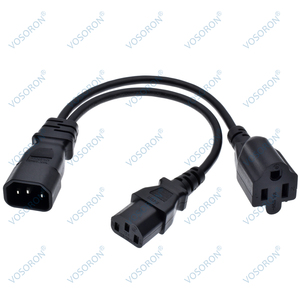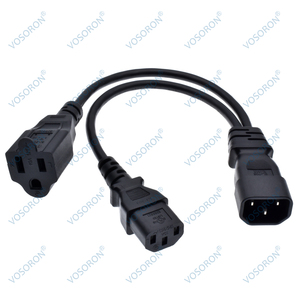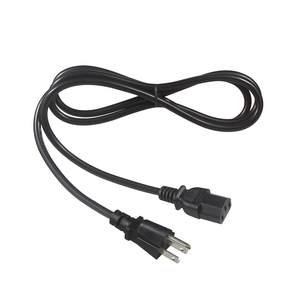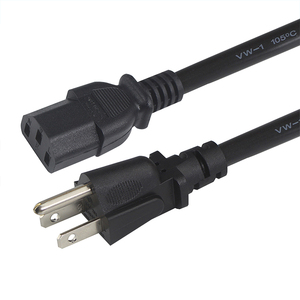
All categories
Featured selections
Trade Assurance
Buyer Central
Help Center
Get the app
Become a supplier

(5941 products available)




















Industrial power cords are largely manufactured in various types. Each of these types is mainly designed for certain applications and environments. The type of industrial power cord needed depends on the machine or appliance's voltage, amperage, and environment. Below are some of the most commonly used industrial power cords:
These types of cords are mainly designed to handle extreme temperatures, abrasion, and oil exposure. Furthermore, their durability makes them ideal for outdoor and industrial uses. In addition, their flexibility ensures easy handling even in tough working conditions.
These cords are specifically designed for use in wet or humid environments. Moreover, their sealing against moisture and dust ensures reliable performance where water exposure is likely. They are mainly used in outdoor construction and agricultural environments.
These power cords are specifically designed to resist elevated temperatures. Such conditions are often found in manufacturing plants and workshops with high-temperature machinery or processes. Also, materials used in these cords withstand heat better than standard wire.
Though they resemble heavy-duty rubber cords, flexible cords are more easily bendable. This feature especially makes them well-suited for movable equipment. They are also ideal for machinery that often needs to be re-positioned.
These cords are typically used for lower-voltage industrial appliances. Such appliances include motors and heating elements. They are designed to connect these devices directly to power sources.
These cords offer customization in length without sacrificing the protective features necessary for industrial use. They also provide an ideal solution for unique installation requirements. Their customization allows the cords to fit the user's specific needs.
The materials used to manufacture industrial power cords largely determine their durability and suitability for specific environments. In addition, these power cords must withstand extreme conditions. Below are the materials that make up industrial power cords:
Most industrial power cords have copper or aluminum conductors. Copper offers better conductivity. On the other hand, aluminum is lighter and more affordable.
Rubber, thermoplastic elastomer (TPE), or PVC is commonly used in constructing the cord's outer insulation. Rubber provides flexibility and durability in harsh environments. Conversely, TPE is more resistant to chemicals and oils. Lastly, PVC is a cost-effective option for less demanding applications.
Material used to manufacture insulation for industrial power cords plays a vital role in durability. It often protects the cord from heat, chemicals, and mechanical stress. In addition, the outer sheath also helps prevent electrical hazards.
Apart from durability, the insulation also affects the cord's flexibility. More flexible cords are generally easier to handle in industrial environments. This is because they are easier to maneuver around equipment and tighter spaces.
Most industrial power cords are designed to be used in certain environmental conditions. These conditions include exposure to water, dust, or extreme temperatures.
Waterproof cords have sealing elements between the plug and the cord. This feature protects them from moisture and dust ingress. On the other hand, high-temperature cords are ideal for environments exposed to heat, such as foundry or furnace areas. These areas have resistance to heat as a primary feature.
The inherent design of industrial power cords ensures they offer long-term reliability. Furthermore, longevity directly impacts operational safety and system uptime.
In addition, cords that are rubber-sheathed, waterproof, and high-temperature resistant have extended lifespan capabilities over standard cords. This allows them to reduce replacement frequency significantly.
As a result, detailed longevity not only minimizes downtime but also leads to substantial cost savings for users.
Here are the common applications of industrial power cords:
In manufacturing facilities, heavy machines such as conveyors, robotic arms, and large motors use these cords. The reliable energy transfer capability of industrial power cords allows these machines to operate smoothly.
These industrial power cords offer a dependable power supply for tools like drills, saws, and mixers. This is even in remote locations where electricity grids are absent. Their durability ensures they operate effectively under harsh weather conditions.
In warehouses, the cords keep systems like automated guided vehicles (AGVs) and large battery chargers running. Reliable power is essential to maintain order fulfillment and inventory management systems. That is why the industrial power cords that help minimize downtime are vital.
Mining machinery like drills, excavators, and transport vehicles heavily relies on these power cords. Their abrasion and moisture resistance ensure machinery keeps operating in the harshest underground conditions.
Industrial power cords keep equipment like irrigation systems, milking machines, and grain dryers running in agriculture. The cords' waterproof and dustproof designs ensure they operate reliably in outdoor and rural environments.
In this industry, the cords power exploration and extraction equipment. Their high-temperature and chemical resistance make them ideal for use in these challenging environments. They also help maintain operational integrity.
These cords keep servers, cooling units, and backup generators running in data centers. Industrial power cords have protective features that ensure uninterrupted power supply. This makes them crucial for maintaining the uptime of critical computing systems.
Industrial power cords are widely used in event management to power lighting, audio-visual equipment, and exhibition tools. Event venues' durability and flexibility make them suitable for outdoor and indoor environments.
The voltage and amperage that industrial power equipment uses determines the type of cord it needs. For example, a heavy-duty machine uses a heavy-duty cord. This is when a machine operates at high voltage and high amperage.
A cord that is rated for high voltage and high amperage has to be used.
How durable and flexible the cord is determines how well it can function in certain industrial environments. For example, flexible cords are more ideal for equipment that moves around frequently.
This is because they allow easy bending without breaking. On the other hand, heavy-duty cords are better for stationary equipment. This is where durability against environmental hazards is more important. Such hazards include extreme heat, chemicals, or constant abrasion.
How long the cord needs to be depends on the distance between the power source and the equipment. This distance is measured in cord length. Going for the right length cord prevents excess slack or tension.
Excess slack or tension can be hazardous in an industrial setting. Additionally, extra features like waterproofing or reinforced strain points can offer more protection. This extra protection helps in specific environments like construction sites.
The ease of installing and maintaining the cord is crucial for operations that need minimal downtime. For instance, cords that come with simpler connectors or quick-release mechanisms can speed up installation and replacement.
This reduces overall maintenance time. No one wants to deal with complicated cables in situations where productivity is essential. That is why going for simpler cables is a must.
The factors that affect their pricing include cord length, material quality, insulation type, and the number of conductors. The more durable and longer the cord is, the costlier it will be.
Yes, waterproof industrial power cords have an IP rating. These ratings indicate the level of protection against water and dust. For example, IP67-rated cords are protected against water immersion and dust ingress.
Yes, some cords can handle surge protection. But only those manufactured with additional protective components like surge protectors or circuit breakers can handle surge protection.
The lifespan of these cords depends on factors like environmental conditions, maintenance, and usage. But manufacturers normally rate heavy-duty waterproof cords for over 10 years. The IP rating of the cord also affects its longevity.
Most power cords have a 15 to 30 amp rating. This is a safe range for carrying electrical currents. Going for cords with the right amp ratings will prevent overheating.